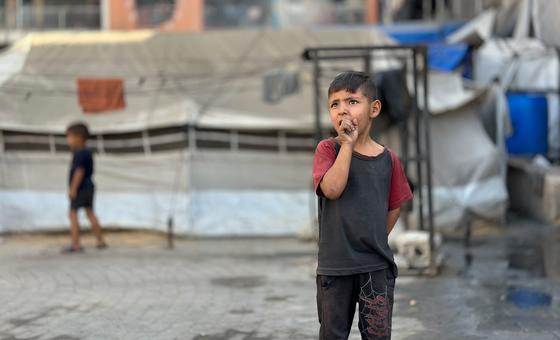UN Rights Chief Urges US to Lift Sanctions on Palestinian Rights Groups Amid Gaza Crisis
International affairs correspondent with extensive experience covering global politics, diplomacy, and cross-border issues

As violence continues to escalate in Gaza, the United Nations human rights chief has issued a strong appeal to the United States, urging the withdrawal of sanctions against key Palestinian human rights organizations. This development comes amid a worsening humanitarian situation in the region, with increasing civilian casualties and reports of famine.
The UN's High Commissioner for Human Rights, Volker Türk, has called on the US to rescind sanctions imposed on three significant Palestinian human rights groups: Al-Haq, the Palestinian Centre for Human Rights (PCHR), and the Al-Mezan Center for Human Rights. These organizations have been pivotal in documenting and advocating for accountability regarding human rights violations in the Occupied Palestinian Territory, particularly in relation to the ongoing investigations by the International Criminal Court (ICC). Türk emphasized the critical nature of their work, especially as reports of systematic violations in Gaza and the West Bank, including East Jerusalem, continue to emerge.
The sanctions, initially announced on Thursday, have drawn widespread condemnation from various human rights bodies and international observers. Türk warned that these measures could have a 'chilling effect' on civil society not only in the Occupied Palestinian Territory and Israel but globally. He also urged the US to lift previous sanctions on the UN Special Rapporteur on the situation of human rights in the Palestinian territories since 1967, as well as on several judges and prosecutors of the ICC. The implications of such sanctions extend beyond regional politics, potentially undermining the credibility and effectiveness of international human rights mechanisms.
Amid this diplomatic tension, the humanitarian situation in Gaza continues to deteriorate. The ongoing Israeli military offensive has intensified, causing significant civilian harm and damaging essential infrastructure. UN Spokesperson Stéphane Dujarric reported that Israeli forces attacked a high-rise building on Friday, leading to further displacement and suffering. The cost of displacement is prohibitively high for many, with transportation costs reaching up to $1,000, leaving thousands trapped in increasingly dire conditions.
The crisis is compounded by a looming famine, as highlighted by WHO chief Tedros Adhanom Ghebreyesus, who described the situation as a 'preventable catastrophe.' Starvation as a method of war, he asserted, constitutes a war crime. Despite efforts to mitigate the crisis, over 370 people have died from malnutrition, with more than 100 cases of Guillain-Barré Syndrome reported. Ghebreyesus urged Israel to allow medical evacuations and called on the international community to provide critical aid.
As the conflict rages on, the international community faces mounting pressure to intervene. Tedros appealed to Israel's allies to leverage their influence to halt the hostilities and address the humanitarian needs urgently. He also highlighted the importance of opening borders to allow critically ill patients to receive necessary medical treatment. The call to action is clear: without immediate international intervention, the situation in Gaza could further spiral into a humanitarian disaster of unprecedented proportions.
About Alex Rivera
International affairs correspondent with extensive experience covering global politics, diplomacy, and cross-border issues